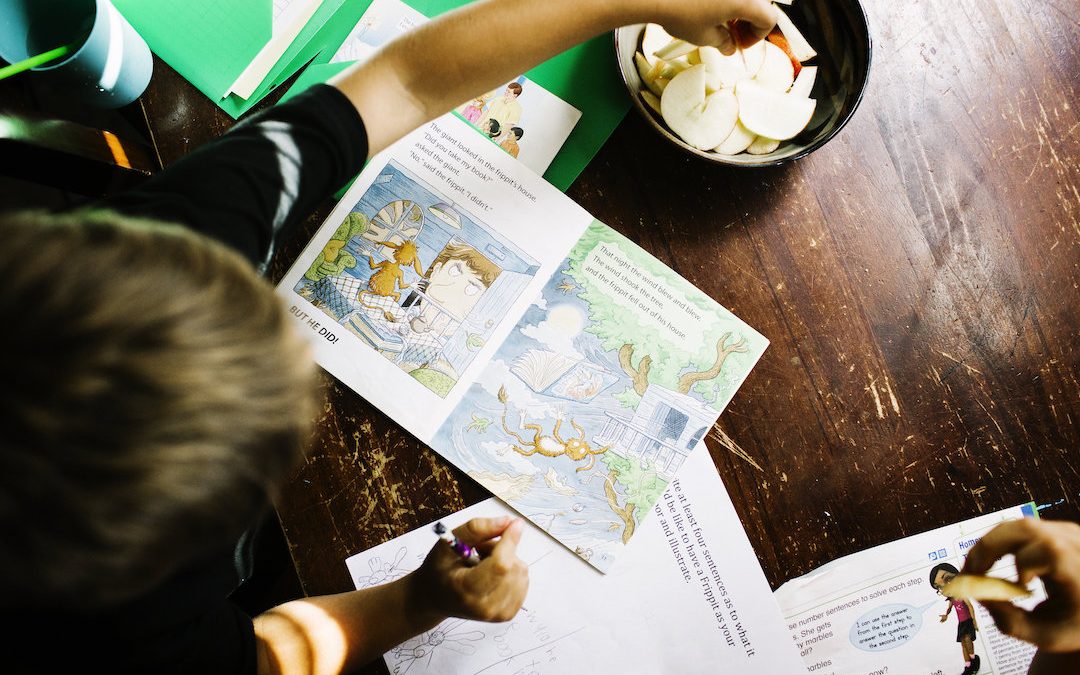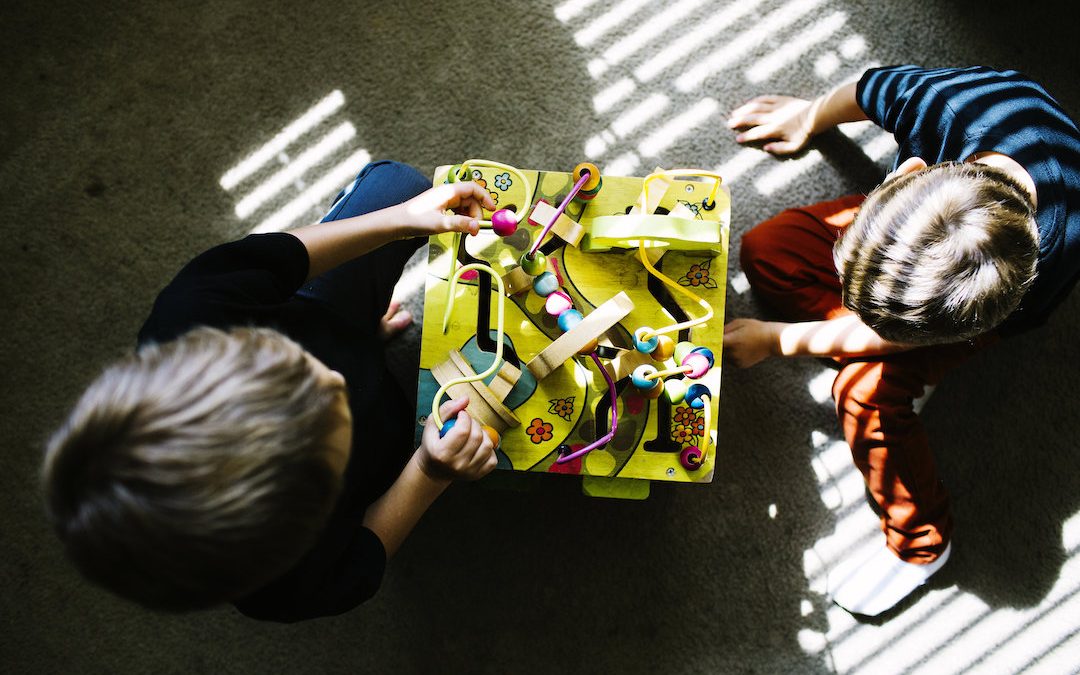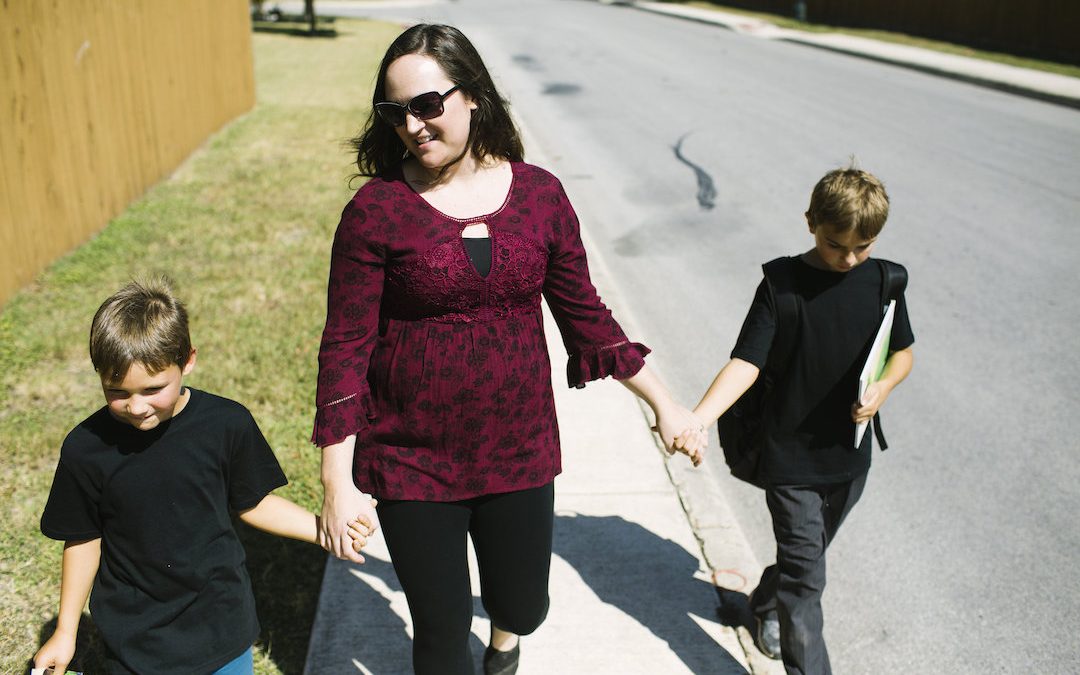
by Rachel Toalson | Crash Test Parents
Any time I’ve asked my children why they love me, I’m always surprised by their answers. I mistakenly think they’ll tie my love to the things I give them or the places I take them or the time I spend with them doing complicated things (like crafting with glitter).
But it’s really much simpler than that.
1. I cook.
Because they love to eat so much, boys can feel love through food. While I don’t always cook and, when I do, it’s not always wonderful, they know I do the grocery shopping and the meal planning and that I provide or cook the most important part: dessert.
2. I read to them.
My sons have grown up on stories, and while they may not yet be able to recognize how important this is for them, they do know the joy of sharing novels, poetry, and true stories with their parents.
Last year I gifted my 9-year-old with a kid’s literary magazine for his birthday. He thought it was the greatest gift ever and tells me so every time a new issue comes in the mail.
I know him—and he knows that knowing equals love.
3. I let them play outside.
I think they mean I make them play outside, but who’s splitting hairs over unimportant things? They know they have the freedom to sword fight with sticks, build forts out of lumber, and dig holes for…well, who knows what (we gave up asking a long time ago).
4. I sign their school folders.
Most of the time—at least until the second semester of school starts and/or my pen disappears, whichever comes first.
(This year we made it to the second semester.)
5. I’m an author.
My sons are still too young to be embarrassed by my status as an author. I’ve visited two of their schools already this year, and they are still proud enough to come up to me and give me a hug in front of their friends, to say, “This is my mom.” I like to think they’ll never stop loving this about me, but I know adolescence takes its toll.
My sons are remarkable kids, and I am amazed, always, by their graciousness and caring ways and their extravagant love. Even on their less-than-stellar days, when they call me the worst mom ever for telling them it’s time to put their technological devices away, they can recognize, deep down, the way I love them in the limits I set.
Stability spells love to children—even if they can’t yet name it but can only feel it.
(Photo by This is Now Photography)

by Rachel Toalson | Poetry
It’s hard to say what inspires.
Sometimes it is the gentle light
of a morning, a pale glowing
in the east that makes the fog
in the air, left over
from the night,
shimmer.
Sometimes it is the curve
of a tiny cheek, turned toward
the sleepy light,
marked with fluttering lashes.
Sometimes it is a word,
a picture, wisdom someone
shared a hundred years ago.
They all open
the cascade of creativity,
marrying a pen to a page
so another story is born.
This is an excerpt from Textbook of an Ordinary Life: poems. For more of Rachel’s poems, visit her Reader Library page, where you can get a few volumes for free.
(Photo by Art Lasovsky on Unsplash)

by Rachel Toalson | Crash Test Parents
There are many things you don’t ever think about before you become a parent—things no one will find it necessary to mention to you, either (even though there are many things they will mention to you unnecessarily).
I read so many books before I became a parent, but I was still ill-prepared for all the things I would have to give up.
You give up so much. You give up things like:
Long phone calls.
Every time I start to dial the number of a doctor or someone I need to talk to (because I hardly ever call the people I actually want to talk to), it doesn’t take my children long to realize what’s happening. In fact, I usually have to tell the hold music to hold on—because one of my twins has taken out the rake from his daddy’s shed and is running toward the other twin with said rake raised above his head and a guttural yell straight from the pages of Lord of the Flies tripping along ahead of him. It’s always my luck that the hold music stops and a person actually answers the phone when I’m in mid-yell—“Cut it out, or you’ll have to come sit with me for the duration of this call!” I don’t apologize. Instead, I usually pretend they didn’t hear anything.
They probably didn’t. Their “How can I help you?” didn’t sound worried at all. It was my imagination.
Real dates.
If you have as many kids as I have, a date can seem like a luxury. Husband and I haven’t had a real date in four months—and by real date, I mean a date that actually gets you out of the house. It’s not because there are no babysitters willing to sit on a Friday night and watch my kids sleep but because we’d have no money left, after paying a sitter (or two), to actually have a date. I suppose we could ride around in the car looking at Christmas lights (for a three-week span during the year) or walk through a park (the temperate climate of South Texas is limited to the same three-week span; who wants to sweat on a date or freeze half to death?) or recline the van seats and take a long, uninterrupted nap.
But I’d like, for once, to have a restaurant-cooked dinner where kids weren’t hanging around outside the door, peering through the crack between the bottom of the door and the floor, whispering that they’d like to have some French fries once in a while, too. A dinner out would be nice now and then.
Extended conversations.
We try really hard to teach our children not to interrupt, unless there’s an emergency. The problem is that kids have a very hard time defining “emergency.” They will interrupt us to tell us the computer froze while they were playing Minecraft (this was unauthorized play, an observation that will come with a whole half hour of argument). They’ll interrupt us to ask why rain tastes like dirt mixed with sky mixed with musty fart (they’re the kids of a poet; what do you expect?). They’ll interrupt us to tell us all about the cut they just got on their finger—the middle one, of course—that you’d need a microscope to see but for which they need a Band-Aid—maybe two. Seriously, they do. They’re bleeding! All this while unintentionally flipping us off.
Husband and I have gotten really good at leaving sentences unfinished and assuming the other knows what we were going to say. We have been married thirteen years, after all.
I won’t go into all the trouble this can cause. Arguments are good for marriages.
Trips to the store together.
The last time we all went to the store together, two kids fought over who was going to push the cart and nearly tore off my toe in the process, another kid slipped three packages of chocolate chips into the basket when we weren’t looking, another kid flattened himself on the bottom of the cart so he could fly and ended up smashing his finger (which I told him would likely happen), and another kid disappeared for half an hour while all the frozen fruit and vegetables defrosted because of a very hastily-organized search party. We almost left without the last kid, who was charged with watching the defrost process so he could report about it later, keeping the secret about the chocolate chips, and not moving the cart. (I dare you to guess which one of those instructions was mine.)
Never again.
Confidence.
Kids will say anything—and everything—to other people. They will tell another person how old you are (and be way off), how much you weigh (and also be way off), and how hard you cried while watching Pete’s Dragon last Friday. They’ll tell all your secrets, especially to their favorite teacher.
Good luck keeping a healthy sense of confidence with a kid who hugs you, hugs you again, and then asks you if you’re having another baby because your belly sure is poking out.
The most basic form of self-care.
I’m an introvert living with six wild, loud, rambunctious boys, which means I need a daily moment—or a hundred of them—to care for myself. Reading is my favorite way to do this.
Not that I have the opportunity to do it often. When I try to put my feet up for any amount of time, someone decides it’s time to open up the game closet and take out all the games that have no less than ten thousand pieces; someone else decides it’s the perfect opportunity to steal into my room, where all the devices are stashed in hiding places (we’re running out of unknown places, apparently), and spend some extra minutes doing the forbidden: playing with tech; and still another takes a pair of scissors to his shoelaces, his shirt, his underwear (he wants us to believe he blew out that hole with a massive fart), and, regrettably, his hair.
A nice and tidy home.
It doesn’t matter how many times you remind them where hampers are, where shoe baskets are, where their school things go, kids will walk out of their clothes, kick off their shoes, and drop their school things in the hall and forget all about the after-school procedures they’ve done for the last four years (ironically, the oldest is the most consistently forgetful).
And by the time you’ve solved this problem, they’ve decided it’s time to examine all the pencils in the pencil holder—and by examine, they mean dump them out—because anything’s better than mental math.
Scissors, glue, permanent markers, paints.
Do you know what can happen if you leave a child unattended with any of the fun art supplies listed above? You will end up with a four-year-old who looks like he has mange, another four-year-old who’s no longer hungry because his snack was Elmer’s glue, a four-year-old (previously mentioned—yes, the same one) with permanent whiskers on his face, and another four-year-old (also previously mentioned) with an acrylic mural on his shirt (he didn’t like the one that was already there.).
It’s easier to get rid of them. The supplies, I mean.
Stylish clothes.
My closet has not been updated since 2006, which coincides with the year I became a mother. I am constantly buying clothes—but not for me. No, I buy clothes for the kids who walk on their kneecaps and blow out their jeans within a month of receiving them. I buy clothes for the kids who use the toes of their tennis shoes as makeshift brakes—even when they’re running. I buy clothes for the kids who think “shirt” is synonymous with “napkin.”
The only thing even remotely consistent about my children (besides their complaining about what’s for dinner before we’ve sat down to eat it) is that they will require our entire clothes budget for themselves.
I’m down to my last pair of jeans. Not because they’ve worn out (I hardly ever wear them, to tell the truth), but because, well, things are expanding. If you know what I mean.
Sleeping in.
The beginning of parenthood had me fooled. When Husband and I only had one kid, he slept so late we could wake at a decent hour and still get things done. As the years passed and the kid-count increased, that rise-and-shine time became earlier and earlier and earlier. Now, on a school day, my kids sleep until 6:30 a.m. On weekends they sleep until 5:30 a.m., if we’re lucky. We’re usually not.
Sleeping in is overrated anyway.
We may give up a lot to have kids, but on our best days, we’ll agree that it’s worth it. On the worst days, we’ll still agree it’s worth it—hard but worth it. Because what we get in return—sweet kisses that miss their mark but hit the bull’s-eye, hugs that hold on, a voice that whispers in your ear how much they love you—is what dreams are made of.
At least until you get on the phone with your health insurance and realize it’s going to be a long afternoon in more ways than one.
This is an excerpt from Hills I’ll Probably Lie Down On, the fourth book in the Crash Test Parents series. To get access to some all-new, never-before-published humor essays in two hilarious Crash Test Parents guides, visit the Crash Test Parents Reader Library page.
(Photo by This is Now Photography.)

by Rachel Toalson | Wing Chair Musings
At the close of every year, I always find myself turning my gaze to the new year—sometimes even before it’s time.
There are certainly times in which to begin anew—the beginning of a summer, a birthday, an anniversary, the start of a school year. But there is no time that lends itself to new beginnings quite like a new year. It’s a wide open opportunity that meets each of us with a clean slate, a schedule that hasn’t yet filled with activities (unless you have school children). We aren’t on the hook for projects to deliver or goals we’ve set and still need to meet. Everything is expansive and rich with potential.
If you want to make a drastic change in direction, a new year is the perfect time to do it.
Sometimes that can be an unsettling thing, like a writer facing a blank page for the first time, which is pretty much any time, because there is no formula for writing. So much space and possibility can feel intimidating to some.
I get giddy with anticipation. I evaluate and schedule and write down goals and revise goals and decide on publication dates for self-published books and mark dates for traditionally published books and plan for the projects on which I’d like to focus for the coming year and try to anticipate the bumps I might meet in the road (though I can’t always predict those with any accuracy.). I analyze daily writing expectations, manage those expectations, strip everything away and add it back. I brainstorm new ideas and white board and think, think, think. I evaluate my schedule and see if it still works for me.
People who know me well know that I also, at the end of every year, choose a word with which to frame my new year—in both family and in business. Our family word for 2019 is “optimize”: we’ll be looking at processes and rules around our house and reevaluating and streamlining them. We’ll be working, mostly, on relationships and optimizing the time we have together.
I had trouble settling on a word to frame my business. But after much thought and consideration, I chose the word “assert.”
Assertion is not one of my strengths. When faced with a decision to assert my needs that come in conflict with another’s needs, I will generally default to that person’s needs. This could be the result of residual trauma from my past, or it could simply be a weakness of mine cultivated in my childhood quest to demand the least attention, step on the fewest toes, be the “easiest” child. But what I have learned of weakness is that when we recognize it, examine it, and intentionally practice strengthening it, it will not remain a weakness for long.
This last year I encountered several instances in which I needed to assert myself in order to make sure my needs were met in a timely and efficient manner. Instead, I chose the least resistant path—that of acquiescence and accommodation.
Assertion is an important part of communication when you work for yourself and you depend on other people for your ultimate success. Asking for what you want and need is necessary for healthy relationships, successful careers, and even enduring marriages.
I don’t yet know for what I will ask in this new year, at least not completely. But I do know that when I stumble into a situation that calls for assertion, I will be (mostly) ready to stumble through it (we all start somewhere) and, by the end of the year, walk through it with my head held high.
What word will you choose to frame your year?
(Photo by NordWood Themes on Unsplash)

by Rachel Toalson | Poetry
9:00:04
When the hour is
late, I find myself thinking
of dangerous things.
9:00:05
I know the hour
isn’t exactly late—but
this is late for me.
9:00:07
What if there is something
more to this catch in my
throat? What if it’s bad?
9:00:08
What if those allergies
are not just allergies?
What if it is worse?
9:00:09
What if the doctors
aren’t able to cure my
brother? What if he dies?
9:00:10
What if something happens
to our car? How will we
run all the errands?
9:00:11
How will we work? How
will we recover from a
setback like that one?
9:00:12
What if I never
publish another book? What
if I can’t keep up?
9:00:13
What if one of my
children is lost, hurt, damaged,
bullied, broken, killed?
9:00:14
It only takes a
few seconds to run through all
the scenarios.
9:02:57
Anxiety runs
cold, hot, numb, excruciating—
and always there.
9:03:36
I turn my thoughts to
happier things; it’s like turning
a ship around.
9:03:59
I think about love—
the beauty of loving
another and the world.
These are excerpts from The Book of Uncommon Hours, a book of haiku poetry. For more of Rachel’s poems, visit her Reader Library page, where you can get a few volumes for free.
(Photo by Martin Castro on Unsplash)

by Rachel Toalson | Crash Test Parents
I never thought I’d be a mom of all boys. When I first started my parenting journey, I thought for sure that I would have one or two girls in the mix, because everyone I know does. But then we had boy after boy after boy, and I realized, soon enough, that I was not meant to be a girl mom.
I was meant to be a boy mom. And there’s something really special about boy moms.
1. You’re the prettiest girl they’ve ever seen.
You’ll always be the prettiest girl they’ve ever seen. You are the standard to which they will hold every other girl, at least for a while. They think you’re beautiful when you’ve been wearing the same workout pants for three days in a row and when your hair hasn’t been washed in a couple of days and when you don’t even have makeup on. They think you’re beautiful when you’re in a bad mood and a silly mood and an I-don’t-really-want-to-be-a-mother-today mood. They think you’re beautiful because they see through a lens of love.
2. You will get grossed out daily.
Most kids are pretty gross, but boys are the worst. They don’t care about the snot running all the way down to their chin; they’ll just reach their little tongues up to “wipe” it away. They don’t care that if they hug you, they’re going to get a big slimy glob on your shoulder. They don’t care that when they poop, they probably need at least three good wipes. They’ll leave it at one and then stripe the toilet with the rest. Boys are pretty gross. Just get used to it.
3. You’re a flower repository.
Every time you pass a wildflower field, boys will want to go pick as many flowers as they can and bring them back to you. They will want you to try to put those centimeter-long stems in your hair, even though they’re too short to wrap around your ear. They will want you to put the pink ones in a vase so they can show off the bouquet to whomever may come to visit today, which is usually no one, because when you’re a mom of boys, you’re not often entertaining anyone else. Or maybe that’s just me. Maybe I’m the only one afraid of social contact after being slimed all day by boys.
4. You will have regular exposure to potty humor or humor related to bodily functions.
Boys think all bodily humor is hilarious. And I mean all of it. If you make a farting sound between the lyrics to “Happy Birthday” while you’re singing to their brother, they will fall apart giggling. If you end your prayers with an arm fart, or try to pretend like you’re arm farting the ABC song, they will laugh until they’re crying. If you say anything about “penis” or “naked booty,” or “burp-farts,” they will shriek with delight.
5. They’re obsessed with their body parts. One in particular.
Not only do my boys love streaking through the house naked, even though they’ve been instructed to put on their pajamas directly after their bath so that we can get along to story time, they are fascinated by their body parts—well, one body part. They will play with their penises and compare penises and try to smack each other’s penises just for the fun of it. They are uncivilized and untamable.
6. When you burp at the table, you feel like you’ve just won an award.
Boys will be contagiously delighted when their mom burps at the table. They think it’s the funniest thing ever. Which is great, because holding in gas was never really my strong point. I always thought it was a flaw. Turns out it’s not, because, that’s right. Boys. I win the table every night, after the last bite. They’ll laugh and applaud and I’ll feel on top of the world, because I’ve never won anything in my life.
7. You get used to naked people.
As soon as the 6-year-old gets home from school, he likes to strip down to his boxers or underwear, whichever it is he’s wearing for the day. He knows, of course, that he has to put on clothes to go outside, but that doesn’t even matter. He’ll choose a whole new ensemble if he goes outside, because those other clothes were the slightest bit damp from the walk home, and he “doesn’t like to sweat.”
The time just after baths in our house is a constant chorus of “Go put on your pajamas” and “Here are your pajamas. Put them on.” and “You can’t sit on my lap naked,” because, well, boys just like the feeling of running free.
8. You don’t get to hold them for long.
A few days after my youngest turned 1, he started coming over to give me a hug and then immediately squirming out of my arms before I was ready to let him go. Boys are active and rambunctious and prefer, always, to move. Every now and then I can entice this littlest one to stay a while, if I’m bouncing around or doing a ridiculous dance, or if I start running through the house, but if I’m not doing any of those things, he’s not going to make an effort to stay.
Boys want to be moving at all times. I, on the other hand, don’t. But I do want to snuggle with my boys every now and then, so sometimes I’ll pick myself up off the floor, with great, sighing effort, and run around, too. Sometimes it’s the only way I can steal a quick hug.
9. Disgusting smells become everyday smells.
My upstairs smells like a swamp, because there’s a bathroom with a toilet up there that the boys always, always, always forget to flush. Their room smells like a locker room, because not only do they need to start wearing deodorant right about now, but they also like to wear their soccer socks for three days in a row, and, believe me, you haven’t smelled disgusting until you’ve smelled worn-three-days-in-a-row soccer socks (or the shoes that have embraced them all day). Not only that, but whenever a boy is sitting on my lap, a cloud of fumes inevitably forms around us, because they’re really, really good at SBDs (silent but deadlies—it’s a type of fart you probably don’t ever want to experience, in a class of its own). I can usually tell who’s the culprit because of the self-satisfied smirk on his face while he looks around to see if anyone noticed. Of course we noticed. It smells like a sulfur plant in here. My nose hairs are singed.
Boys aren’t easy. They’re a whole lot of work. They require more energy than we’ll probably ever have, because they never, ever stop. They’re always getting into things, especially the food, and they’re always making a mess, especially with the clothes they stripped off and left on the floor, and they’re always asking us if we smelled that or if we want to see what they just did to the toilet (forever and ever answer: Nope.).
But the most amazing thing I’ve learned about boys is that they will love the insecurities right off a mama. They will love her doubts to disintegration. They will love away all that has come before and infuse hope into all that comes after.
I know, because that’s what my boys have done for me.
And I’m so very glad.
This is an excerpt from This Life With Boys, the third book in the Crash Test Parents series. To get access to some all-new, never-before-published humor essays in two hilarious Crash Test Parents guides, visit the Crash Test Parents Reader Library page.
(Photo by This is Now Photography)

by Rachel Toalson | Wing Chair Musings
I sat in my bed, reading. My eight-year-old appeared by the side of the bed and said, “The speech teacher took me out of class today. She said I say my s sound wrong.”
I know this already; I’ve been in communication with his teacher about it. I said, “Oh yeah? How did it go?”
“She taught me how to do it right. But I forgot.” He danced out of the room, as though the conversation was now done. I watched the doorway for a minute, thinking maybe he’d gone to get something.
A few minutes later, when I’d returned to my book, he crept back inside my room. “I don’t know if I’ll ever be able to say my s right,” he said. Before I could answer, he shot from the room again, this time racing his words out.
It didn’t take him long to return. He said, “It’s something like this.” He tried to say an s. He tried again. And again. His eyes filled. “I can’t do it.”
I took him in my arms and told him that just because he couldn’t say the s sound correctly doesn’t mean there’s anything wrong with him. I don’t always know the right thing to say at times like these, but I do know that kids need reminding—often—that there is nothing wrong with them, they are brilliantly spectacular as is, they are loved. I always start there.
He pulled away and said, “What if I don’t ever say them right?” He looked at the ground, not at me.
This son is my pessimist. He will try and try and try until he is weary from trying, but he will rarely believe, even in the trying, that anything good will come of it. When he loses something, it will surely be gone forever (but he’ll still keep looking). When a friend isn’t home to play with him for a day, he’ll probably never be able to play with this friend again (but he’ll still knock on the door and ask tomorrow). When he has to clean up his mess before tech time, he’ll probably never, ever, ever be done (but it’ll only take him a minute).
I could feel his anxiety, hanging like a heavy cloud between us.
I said, “How old are you?”
“Eight.”
“For eight years you’ve been saying the s sound wrong. It will take more than one session with the speech teacher to correct your habit.” I paused to make sure he was still listening. He was playing with something on my bed, his head tilted a little. I knew his ears were tuned to me. I said, “You’ll get it. I believe in you.”
Sometimes a parent believing is enough.
I’ve had to reassure him of this same thing several times over the last weeks. There’s nothing wrong with you, remember who you are, you’ll get it. With enough repetition, the words will get lodged so deeply in him that he’ll never get them out.
In the middle of all that repeating, all that reminding, we continue to help him practice his s sound, perfect it, have a little fun with it. And maybe, by the end of all this, when the s sound comes easily and naturally as though it were never a problem in the first place, he’ll realize that nothing is impossible when you have a team.
(Photo by This is Now Photography)

by Rachel Toalson | Poetry
i
Why do we do what we do?
How can we act differently?
What keeps us from doing the unthinkable?
Can we replicate more of it?
ii
What causes anger?
What does hatred have to teach us?
What have we done with our expectations for being human?
iii
What does our digital world do to our emotional stability?
What can we do to practice empathy?
iv
Who are you?
Who am I?
What links us together?
v
What is the relationship between what I want and what you want?
How do we both get what we want?
vi
How do we find our way in a world of terror?
How do you find courage to be a parent?
How do you parent without damaging your children?
What would cause a mother to strike her child?
How do you teach your children about love, mercy, justice, empathy, tolerance, truth, hope, wonder, dreams, intelligence, relationships?
vii
How do we improve ourselves?
How do we improve our society?
How can we expect more?
How can we expect less?
What is tolerance?
How do you make concessions without losing yourself?
viii
What is the shape of this world?
How could we shape it differently?
What causes a person to pick up a gun and shoot a Russian ambassador because of a political preference?
How might we step in the path of that bullet and stop it from meeting its intended mark?
Would we find it imperative?
ix
What kind of love is this?
x
How do we create a better society, a new knowledge, without asking a whole world of new questions?
This is an excerpt from Textbook of an Ordinary Life: poems. For more of Rachel’s poems, visit her Reader Library page, where you can get a few volumes for free.
(Photo by Ousa Chea on Unsplash)

by Rachel Toalson | Crash Test Parents
Every new year I sit down to make parenting goals, in addition to my professional goals. Some years are better than others—I end the year on a laughing note and so can make humorous parenting goals that will continue to launch the laughter into the brand new year.
This year has been a difficult year for us, though. I’ve struggled through some severe depression, one of my sons is currently struggling with severe depression, and we are constantly trying to reconnect and spend time together during an especially busy season.
So this year I decided to make some more serious goals for my 2019 parenting life. Here’s a look at those goals.
1. I will eat mostly healthy.
Kids sometimes make it difficult to make healthy choices—not just because by the time the locusts have finished with our fridge there isn’t much left to choose from but also because parenting is so difficult that sometimes I just want to eat all my feelings. So this year I’ve decided to be more intentional and make better choices on a minute-by-minute basis, one day at a time (we eat mostly healthy already, so it shouldn’t be terribly hard). And the days I reach for a handful of Annie’s bunny grahams or my leftover Trader Joe’s peppermint patties, well, that’s where the next goal comes into play.
2. I will cut myself some slack.
Though I laugh at myself in retrospect—mostly through the humor essays I write—I want to laugh at myself more in the moment. Despite how I might come across in the humor writing you’ve read, I very often take things too seriously. I’m hard on myself. I chastise myself for eating those Annie bunny grahams or leftover Trader Joe’s peppermint patties. In the new year, I want to be nicer and more accepting of my weaknesses.
3. I will get out of the house more.
Even if it’s just for a short walk in our neighborhood, I want to get out more. I walk my sons to school every day and I go to the grocery store and church once a week, but other than that, I’m a hermit, particularly when I’m going through a tough time. I withdraw, huddle inside myself, build my walls. Getting out of the house more will help me in multiple ways, I think.
4. I will hug my kids more.
Our days are so busy that sometimes I get to the end of them and realize I haven’t even hugged a couple of my sons. Some of them act like they don’t want hugs anymore, but they still need them. Even if my hugs are not reciprocated, I will still give them lavishly.
5. I will let them see me cry and open a conversation about it.
This year one of my sons voiced suicidal thoughts. We’ve been on the lookout for depression, because it runs in both our families and was passed to both my husband and me. My sons feel when I’m sad, but they don’t always see it—because I don’t like to let them see it. But the more conversations we can have around this sadness—which sometimes doesn’t have a specific cause and sometimes has an abundance of them—the greater understanding and acceptance they will have of their own sadness. What lives in the dark always seems scary, so we’ll shine the light on it and talk.
I’ll be working hard this year to make sure I take greater steps toward accomplishing these goals. And on the days I fail? Well, there’s always goal number two to keep me trying again and again and again.
I’ve never been one to give up.
(Photo by Annie Spratt on Unsplash)

by Rachel Toalson | Wing Chair Musings
“Can I show you this real quick?”
My oldest son held out the old phone we gave him for his creative projects and a bit of technology time for which he has to complete a number of things before it’s earned. I was putting the last touches on dinner—some baked chicken, some roasted beets and zucchini, and slices of watermelon for dessert. I was moments away from calling in the rest of my sons, from hearing them all complain about how gross dinner looks, from sitting down and trying to remain present.
I’d had a lot on my mind lately. My first traditionally published book had just gone to press, I was waiting to hear back about a potential deal on a second one, and a third manuscript was not quite there yet, giving me fits and starts, making me wonder if it might not just be easier to give up on it.
This summer has felt like a constant battle to remain present.
So I watched the video, impressed by how meticulously my son arranged his LEGO mini figures and took their pictures and set the scene for a story.
“You put a lot of work into that,” I said.
“Yeah,” he said.
“How long did it take you?”
“An hour.”
An hour for five seconds of captured video. He is more patient that I’d ever known him to be. And, like it always does when faced with a moment of brilliance from my children, my heart looked up, straightened from its wilting posture, squared its shoulders, and said, Life is grand, isn’t it?
Until it was time to do after-dinner chores and the same son who spent an hour arranging tiny LEGO pieces and taking pictures could not be bothered to spend fifteen minutes rinsing and stacking dishes into the dishwasher.
The things we love are much easier to spend time doing than the things we loathe.
(Photo by NeONBRAND on Unsplash)











